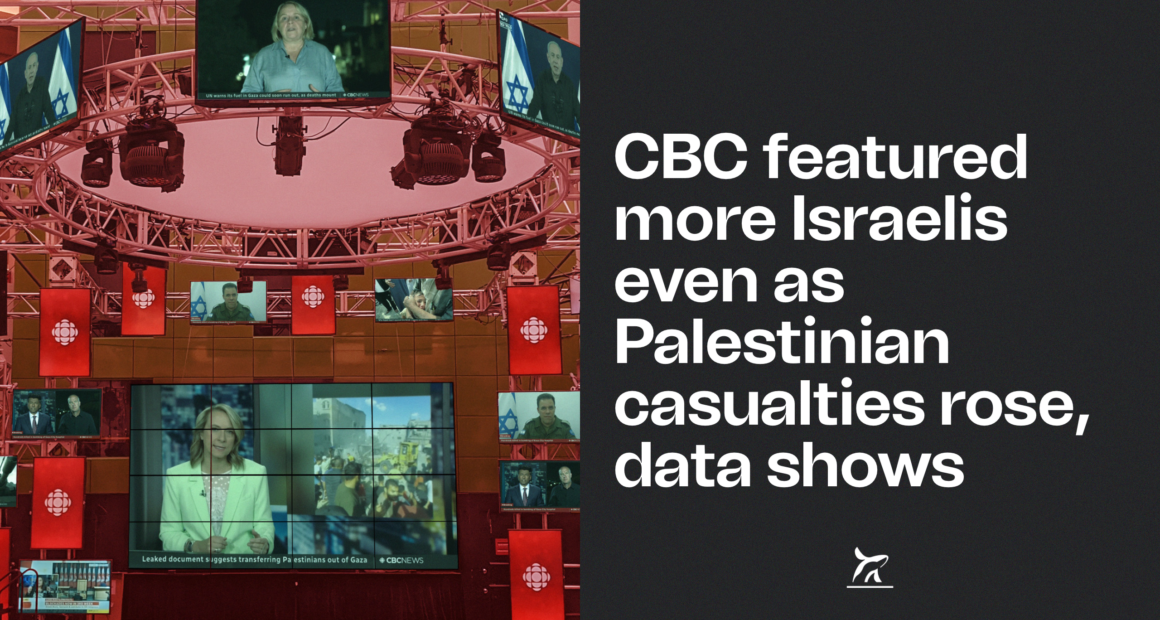Public broadcaster barred employees from sharing outside journalism about Gaza, contradicting CBC’s general policy
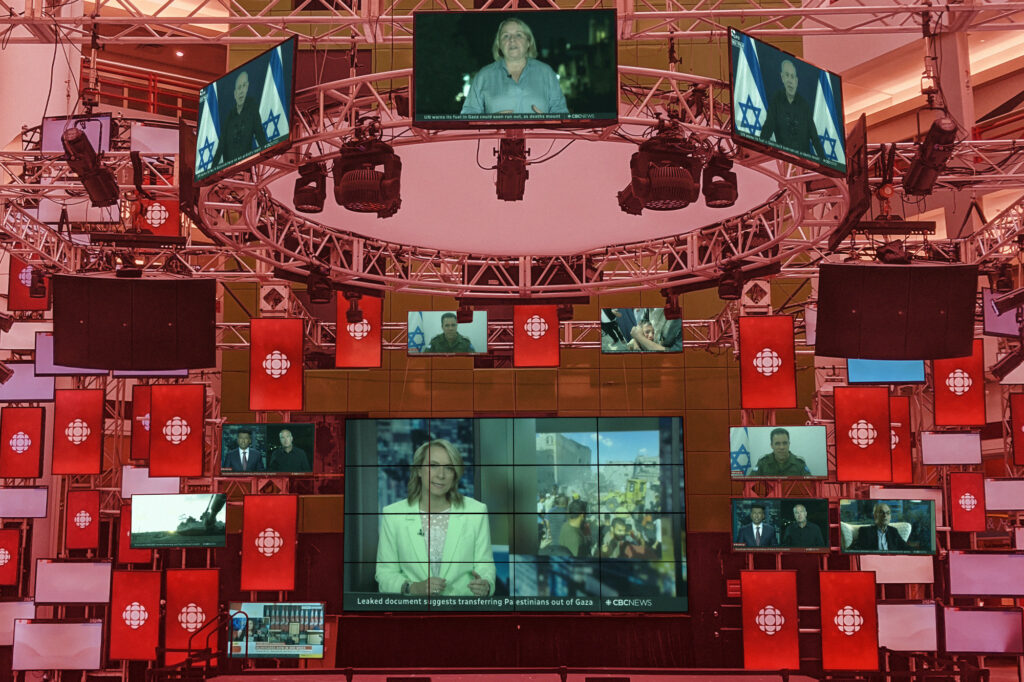
CBC News’ The National featured 42 per cent more Israeli voices than Palestinian in its first month of coverage after the Oct. 7 Hamas attack, a comprehensive analysis by The Breach and Toronto Metropolitan University’s Review of Journalism has found.
CBC’s flagship broadcast continued to feature more Israelis than Palestinians even as the death toll in Gaza mounted. It also failed to identify by name more than a quarter of Palestinians and their allies.
Hamas killed 1,200 Israelis and took more than 200 hostages in its Oct. 7 attack. Israel’s attacks afterward—which have included airstrikes, a ground invasion and the cutting off of essentials such as food and water—killed more than 10,000 Palestinians in its first month, a tally that has since risen to 18,000.
Choices about which voices to air on CBC have taken on greater importance because the Israeli military has prevented any international media from entering Gaza.
Despite not having any journalists on the ground, CBC has barred employees from sharing any information about the war on Gaza on social media that the public broadcaster has not itself reported.
This contradicts CBC’s broader social media policy, which is not publicly available but a copy of which The Breach obtained. The policy permits sharing “outside journalism if the story or piece is not available on CBC.ca and the source is credible”—meaning the broadcaster is maintaining a double standard when it comes to Gaza.
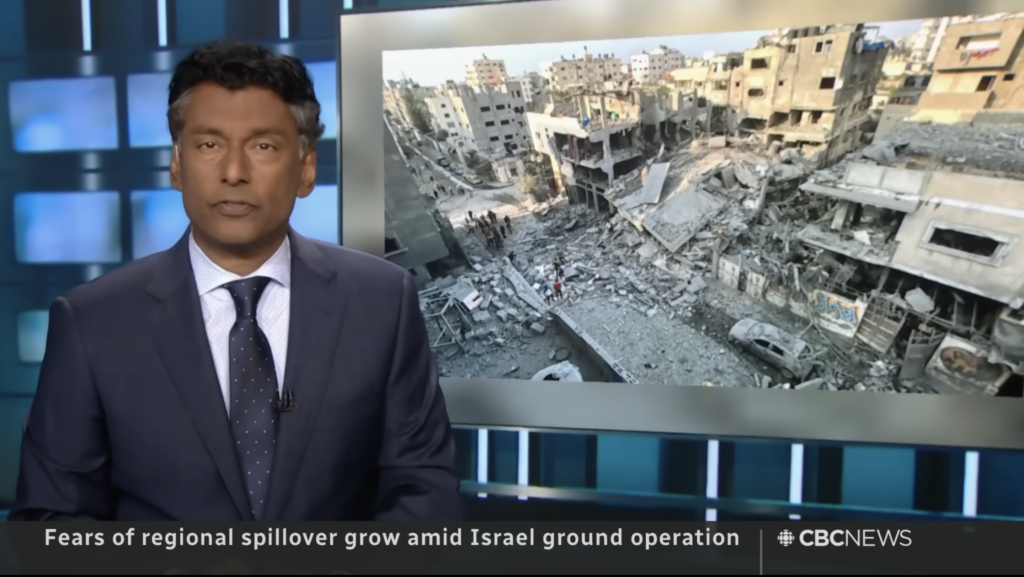
While there were no reporters on the ground in Gaza, correspondents Adrienne Arsenault, Chris Brown, Susan Ormiston and Margaret Evans all reported from Israel.
A spokesperson for CBC provided a written statement but did not answer all of The Breach’s specific questions, including about how CBC’s latest directives contradict its policies.
“CBC News is grateful for the significant amount of feedback we have received about our coverage of the Israel-Hamas war,” the spokesperson said. “Many of the comments over the past few months called our coverage too pro-Israeli or too pro-Palestinian. We look at all the examples provided to us and take them into account in our ongoing editorial review of our coverage.”
“Our journalism does not consider ‘sides,’ rather we report the news from a wide array of perspectives.”
But one CBC News staff member who spoke to The Breach said the public broadcaster’s coverage has served to “sanitize” Israeli crimes against Palestinians.
This type of coverage will one day be taught in schools and at museums as a factor that contributed to the violence against Palestinians, the CBC employee said. “That’s what makes me feel nauseous.”
Ratio as high as seven Israeli voices to one Palestinian voice
In total, The National featured 138 Israelis and their allies in the first month of broadcasts, while featuring 97 Palestinians and their allies.
On some episodes, the ratio of Israeli voices to Palestinian voices was as high as seven to one.
While only 15 Israelis appeared on screen without being named, 26 Palestinians—representing 27 per cent of all the Palestinians and allies who were on the show—appeared without being identified by name.
Sometimes, such as on the broadcast that aired on Oct. 20, correspondents referenced the level of suffering in Gaza—“The number of dead is so high that people are being buried in mass graves”—without stating how many Palestinians had died.
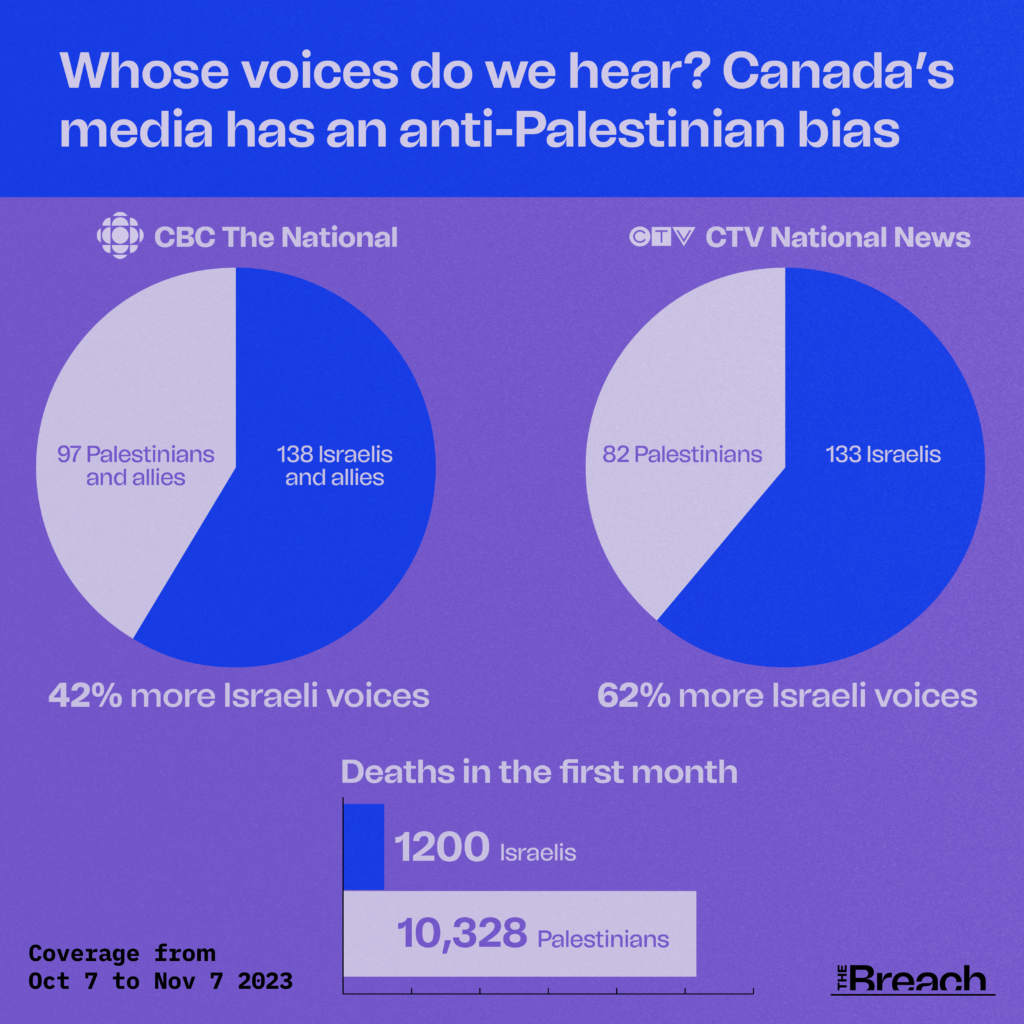
The Breach’s analysis of CBC’s The National is even more comprehensive than its previous study of CTV National News. In addition to counting Israelis, Israeli-Canadians, Palestinians and Palestinian-Canadians, The Breach also counted allies and representatives of advocacy groups representing the interests of both groups.
While the results are not as stark as they were for CTV National News, which featured 62 per cent more Israelis than Palestinians, they still show an anti-Palestinian bias.
CBC journalists not allowed to share outside journalism, contradicting policy
In an internal email sent on Nov. 9, editor-in-chief Brodie Fenlon told CBC journalists that their job was not to “take a side” but to “provide Canadians with a 360-degree view of the events in Israel and Gaza.”
But other rules he has communicated seem to contradict that mandate.
CBC does not have a journalist inside Gaza, a fact acknowledged in another internal email obtained by The Breach which was sent by inclusion strategy lead Tina Verma on Nov. 21.
Despite that fact, Fenlon has told employees they are barred from sharing information on social media that CBC itself has not reported.
He communicated that rule in an email sent on Nov. 24 about CBC journalists use of social media.
“In its simplest form, [the policy] means that on matters of public interest, controversy, politics or stories we are actively covering as a news organization, we do not post or share to ANY social media platform information that CBC has not or would not put on air or online,” he said. “That includes information we have not verified or are not reporting ourselves as CBC News, even when it comes from external news sources.”
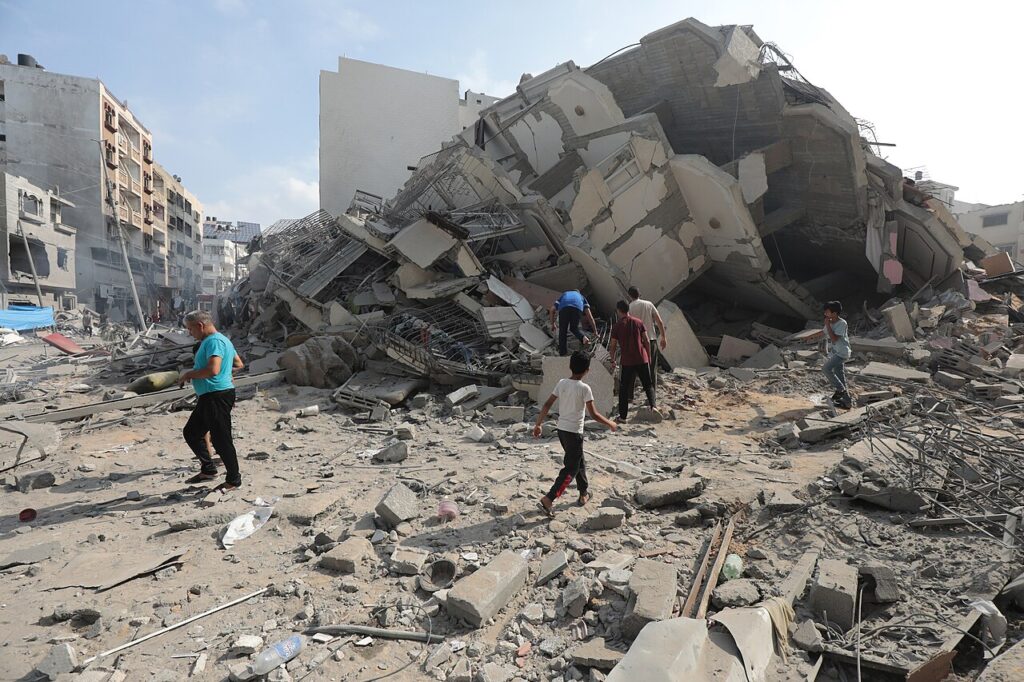
The CBC employee said that Canadians rely on the broadcaster’s reporters not just for their work but for their “news judgement,” meaning the other stories they share online.
“When people aren’t allowed to share, you’re taking away the reporter’s function,” the person said.
“If people feel like we aren’t being truthful, or we’re being muzzled, you’re hurting ongoing trust in the public broadcaster.”
The employee also said they don’t believe CBC’s social media policy on this issue would stand up under the scrutiny of the organization’s journalists, which is why they believe it was communicated by email instead of at a live town hall.
The guidance in Fenlon’s email seemed to directly contradict CBC’s lengthier social media policy, called “Personal social media guidelines for journalists,” a copy of which was also obtained by The Breach.
The broadcaster’s full policy states, “What you can do:…Share links to outside journalism if the story or piece is not available on CBC.ca and the source is credible.”
The CBC spokesperson did not comment on this contradiction but told The Breach the broadcaster’s policy ensures social media posts are crafted with the same care as its journalism on other platforms.
“To be clear, meeting high journalistic standards is not ‘being muzzled,’” the spokesperson said.
CBC’s full social media policy also encourages employees to share their personality, experiences and “emotional reaction” to news stories, while Fenlon’s email said: “Avoid posting information on complex, nuanced stories that are difficult to explain in spaces with limited word counts.”
Multiple CBC journalists pointed out to The Breach that these rules are contradictory, especially for journalists of colour whose experiences and emotions have a connection to Israel’s oppression of Palestinians.
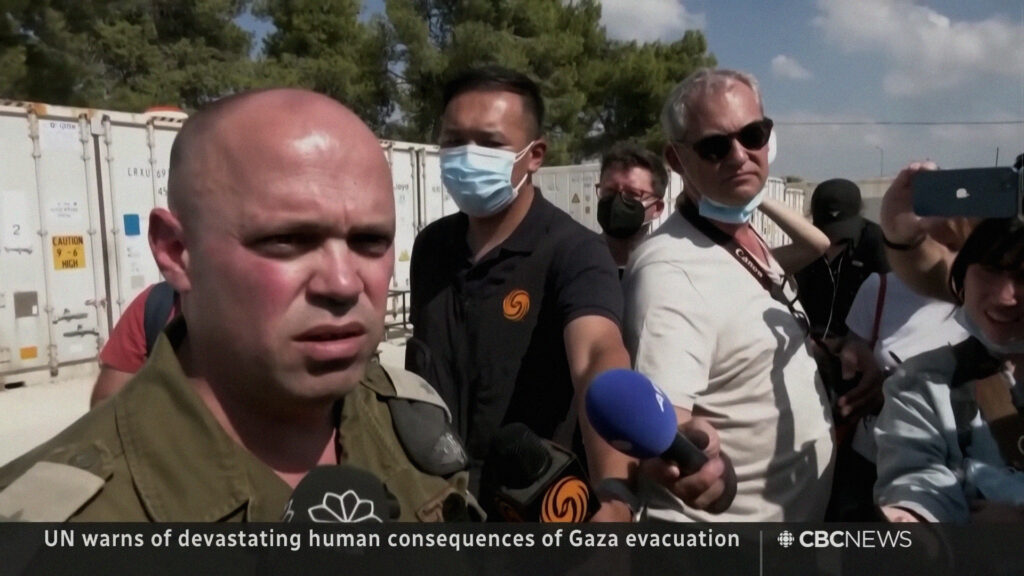
IDF official lied without comment
A military official with the Israel Defense Forces (IDF) was able to make false claims without pushback on CBC, just as other IDF officials were able to do so on CTV.
On The National’s Oct. 13 broadcast, Lt. Col. Richard Hecht explained why the IDF showed freezers full of bodies of dead Israelis to international media.
“It’s not what we usually do,” he said. “But, I know that from tomorrow the world is going to call us war criminals again. We do not attack children. Hamas uses their children and families and civilians as human shields: we don’t do that.”
There was no comment or additional information from CBC’s correspondent or anchor.
At the time, Israel’s military had killed 583 Gazan children. And there is a long and well-documented history of Israeli soldiers using Palestinians, including children, as human shields.
The IDF had an official policy to use Palestinians as human shields until a court ruled it was illegal in 2005, according to B’Tselem. Despite the ruling, human rights groups have documented credible allegations of Israeli soldiers continuing the practice and have criticized what they describe as lenient sentences for those found guilty of doing it.
In 2010, two soldiers were demoted and given suspended sentences for separating a nine-year-old boy from his mother and forcing him at gunpoint to open bags suspected of containing bombs.
There have been other alleged cases of Israeli soldiers using Palestinians as human shields, as recently as October.
CBC’s statement did not acknowledge The Breach’s questions about why the official’s statements were presented without this context.
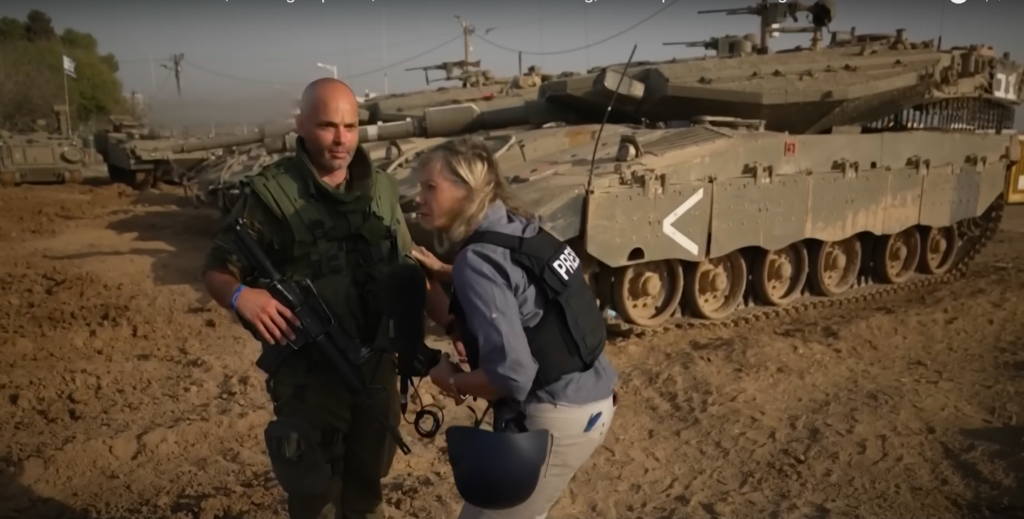
In another example, IDF Major Shraga Sterm described what he believes are the pure motivations of Israeli soldiers.
“None of us here are bloodthirsty,” he said. “None of us here want to kill Palestinians or are motivated by that at all.”
When a weapon was heard firing in the distance, Ormiston—the CBC correspondent who was interviewing Sterm—leaned towards him and grabbed his arm.
CBC’s language ‘sanitizes’ Israeli assault, staffer says
CBC’s correspondents have sometimes used different language to discuss the deaths of Israelis and Palestinians.
On The National’s Oct. 26 broadcast, chief correspondent Arsenault described Hamas’ attack as mass murder while describing the deaths of Palestinians as a claim.
“From the mass murder of more than 1,400 in Israel by Hamas, to Israel’s bombing campaign of Gaza, which the Hamas-controlled health authority claims to have killed more than 7,000,” she said.
The employee who spoke to The Breach said that CBC’s failure is not that it’s not taking the side of Palestinians but that it is not accurately reporting what is happening to them.
“This is a situation where we’re sanitizing and masking the truth,” the employee said. “It’s not about taking a side, it’s just about being honest. Reducing the language, sanitizing the language—that, to me, is extremely biased.”
In particular, the person took issue with CBC’s policy to describe the conflict as the “Israel-Hamas war” when in fact, the violence has been almost completely one-sided since Oct. 8.
CBC has introduced an anonymous form that employees can use to provide feedback about the coverage, one of the internal emails obtained by The Breach said. And the broadcaster has updated some of its guidance for journalists in light of the feedback received.
“For example, it’s worth highlighting that there is a difference between ‘died’ and ‘killed’ and that when we use one term versus another, we should be consistent in the same story,” Verma’s Nov. 21 email said.
This story was produced in collaboration with The Breach, an independent media outlet producing critical journalism. Research was conducted by: Saman Dara, Sam Jabri-Pickett, Helen Jacob, Katia Lo Innes, Hannah Mercanti, Prarthana Pathak and Julia Tramontin.
Disclaimer: The Breach’s senior editor Emma Paling was a temporary worker at CBC News from 2021 to 2022.
Support for The Breach’s work has been provided by the Inspirit Foundation. Inspirit does not endorse, influence, edit, or vet journalistic content in advance of or following any publication.

